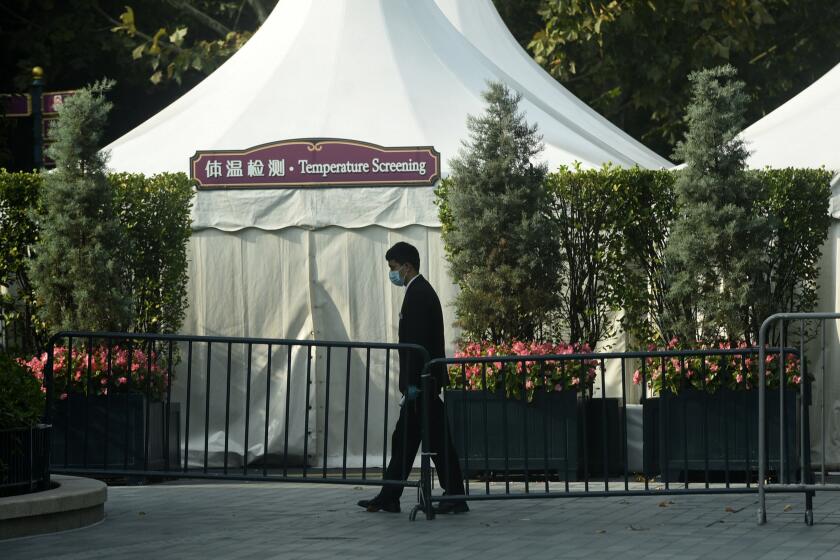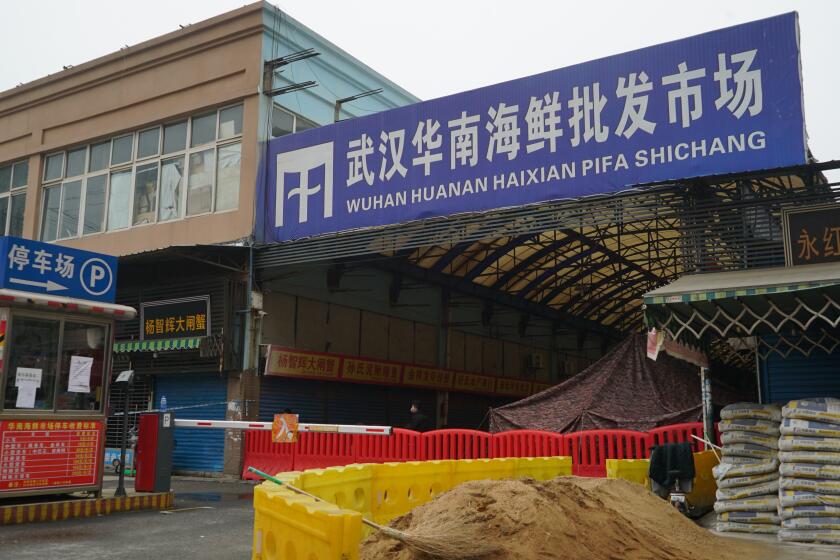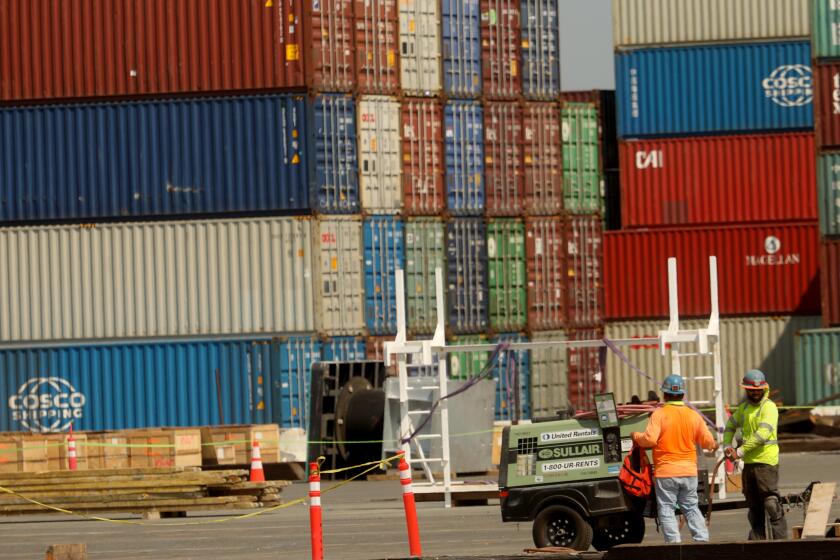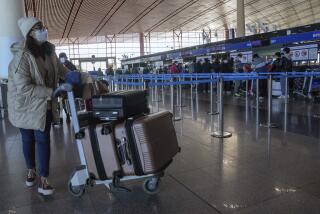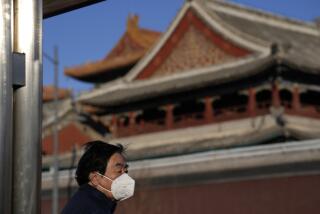In locked-down Chinese city, some complain that food is hard to get
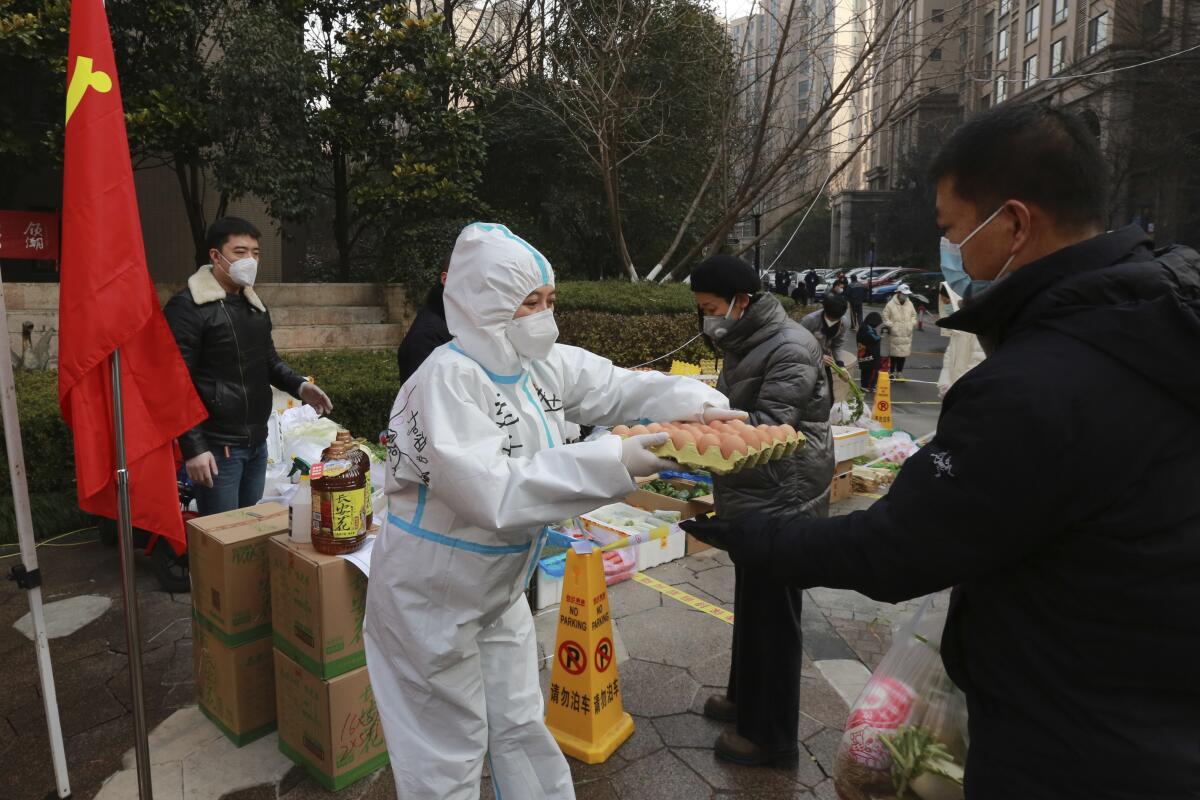
- Share via
BEIJING — Residents of the Chinese city of Xian are straining under a strict coronavirus lockdown, with some complaining of difficulty finding food, despite authorities’ assurances of providing necessities to the 13 million people largely confined to their homes.
Stringent measures to stem outbreaks are common in China, which still maintains a policy of stamping out the coronavirus long after many other countries have opted to try to live with it. But the lockdown imposed Dec. 23 on Xian is one of the harshest in the country since a shutdown in 2020 in and around Wuhan, after the virus was first detected there.
On Tuesday, authorities announced that another city, Yuzhou in Henan province, was placed under lockdown over the weekend after the discovery of three asymptomatic cases.
The Chinese have largely complied with government measures throughout the pandemic, but complaints have cropped up over tough policies despite the risk of reprisal from authorities. The Xian lockdown comes at a particularly sensitive time, as China prepares to hold the Beijing Winter Olympics and is therefore under especially intense pressure to contain this outbreak. The Games open Feb. 4.
“Can’t leave the building, and it’s getting more and more difficult to buy food online,” one resident of Xian said on the social media platform Weibo.
Zhang Canyou, an expert with the central government Cabinet’s epidemic prevention and control team, acknowledged that “there may be supply pressure in communities.”
Shanghai Disneyland will remain closed Monday and Tuesday because a single visitor over the weekend was later found to have COVID-19.
But “the government will go all out to coordinate resources to provide people with daily necessities and medical services,” Zhang was quoted as saying by Xinhua, the official news agency.
The lockdown order in Xian originally allowed people to leave the house every two days to shop for basic goods, but it has since been tightened, though the rules vary according to the severity of the outbreak in each district. Some people are not allowed to go out at all and must have goods delivered to them. People can leave the city only with special permission.
In recent days, people in Xian could be seen shopping at pop-up markets, served by workers in head-to-toe white protective suits. Community volunteers also visited people’s homes to ask what they needed.
Yet the strain is beginning to show, with residents increasingly complaining on Weibo of being unable to source necessities. In one widely shared video, guards could be seen attacking a man who had tried to deliver steamed buns to family members. The guards later apologized to the man and were each fined 200 yuan ($31), according to a Xian police statement posted on Weibo.
A close analysis of Wuhan’s earliest COVID-19 cases points to a live-animal market as the most likely source of the novel coronavirus, a study argues.
In an online diary on the popular Weixin site, a Xian-based writer said that, following an initial wave of panic-buying and the closure of markets, residents soon began searching for food online.
“In this age of material surplus, when everyone is trying to lose weight, finding enough to eat has suddenly become a difficult task,” Jiang Xue wrote.
China’s zero-tolerance strategy of quarantining every coronavirus case, mass testing and trying to block new infections from abroad helped it to contain previous outbreaks. But the lockdowns are far more stringent than anything seen in the West, and they have exacted a toll on the economy and the lives of millions of people.
The measures often fall into place after just a few cases are identified, as was seen in Yuzhou. Since the rules were imposed there Sunday, residents have been allowed to return to the city of 1.7 million but are not permitted to leave and must isolate at home. Only emergency vehicles are allowed on city roads. Restaurants, sports facilities and a wide range of other businesses have been ordered to close, while markets can offer only basic necessities, an order from the city government said.
The Los Angeles and Long Beach ports brace for an imports reduction as the peak holding shipping season kicks off.
Xian, home to the famous ancient terra cotta warriors along with major industries, has seen more than 1,600 cases in a surge that officials say is driven by the Delta variant, which is less infectious than the newer Omicron strain, of which China has reported only a handful of cases. An additional 95 infections were announced Tuesday.
China has seen a total of 115,611 cases and 4,849 deaths since the pandemic began. Although those numbers are relatively small compared with those in the U.S. and many other countries, and likely undercounts as they are everywhere, they do show the persistence of the coronavirus despite the restrictive measures taken by China.
A third round of mass testing has been ordered for Xian, which is capable of swabbing 10 million people in just seven hours and processing up to 3 million results in just 12 hours, according to state media.
In a sign of the pressure authorities are under to curb this outbreak, officials have been put on notice that they will lose their jobs if they don’t bring the numbers of new cases down. Already, the top two Communist Party officials in Yanta district, where half the city’s cases have been recorded, have been fired, according to a statement from the Shaanxi provincial government.
Breaking News
Get breaking news, investigations, analysis and more signature journalism from the Los Angeles Times in your inbox.
You may occasionally receive promotional content from the Los Angeles Times.
Qin Huilin, who works at a traditional mutton soup restaurant, said the lockdown brought business to an abrupt halt.
“We used to have about 100 customers every day, but we’ve had none for more than a dozen days since the lockdown,” Qin said by phone. “The impact on our business is significant, but I can go shopping once every few days in supermarkets, and there are enough supplies there.”
More to Read
Sign up for Essential California
The most important California stories and recommendations in your inbox every morning.
You may occasionally receive promotional content from the Los Angeles Times.
